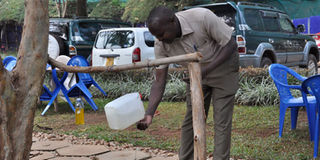Health in your hands campaign returns

Daily Monitor journalist Stephen Otage demonstrates to fellow journalists the use of a tippy tap at the press briefing in Kampala yesterday. MONITOR PHOTO
What you need to know:
Lydia Mirembe, the communication and knowledge management advisor, International Water and Sanitation centre, said about 750,000 children die annually due to diseases related to failure to wash their hands. She said 65per cent of the population have access to water but do not wash their hands and called for more sensitisation
President Museveni is scheduled to grace the national Hand Washing celebrations in Kamuli District in October. The drive aims at raising awareness on the importance of hand washing, according to the national coordinator, Hand Washing secretariat, Mr Robert Otim.
Uganda Water and Environment sector performance reports dating October 2015 on hand washing show that Amuria District topped the hand washing drive with 62.1 per cent while Amudat District trailed with 3.1 per cent.
The Speaker of Parliament, Ms Rebecca Kadaga, will lead a delegation of leaders for the celebrations to be held under the theme; “Make Hand Washing a Habit”.
The drive targets children, mothers and caretakers. Emphasis has been put on washing hands with soap, especially before and after eating food, feeding a baby and after visiting a toilet. Mr Otim while addressing journalists in Kampala urged the media to circulate information about hand washing.
“Hand washing can save people from spending on hospital bills. Parents can also save time to engage in productive work,” he said.
He added that 95 per cent of people do not use soap for washing hands but use it for laundry and bathing.
Ms Naomi Kabarungi, the programme coordinator, Communications and Learning, Water Aid, said: “Uganda’s plan of attaining a middle income status can only be realised if we take note of small things.”
“Ending malnutrition as per 2030 sustainable goals can not be achieved only through providing food but also through washing hands. It seems petty but it is the beginning of the middle income status we want,” she added.
Lydia Mirembe, the communication and knowledge management advisor, International Water and Sanitation centre, said about 750,000 children die annually due to diseases related to failure to wash their hands. She said 65per cent of the population have access to water but do not wash their hands and called for more sensitisation.
“Forty per cent of Ugandans walk more than one kilometre to get water for domestic use,” Ms Mirembe said, adding that the national strategic plan will ensure every village has a well and technology to transfer water from underground to areas of scarcity as per the national strategic plan September 2015.
Appeal
Ms Mirembe urged teachers to include handwashing in lessons taught at school and provide washing places equipped with water and soap.




